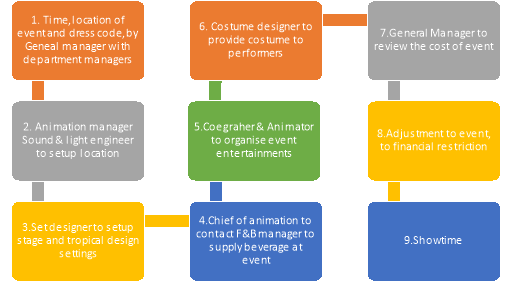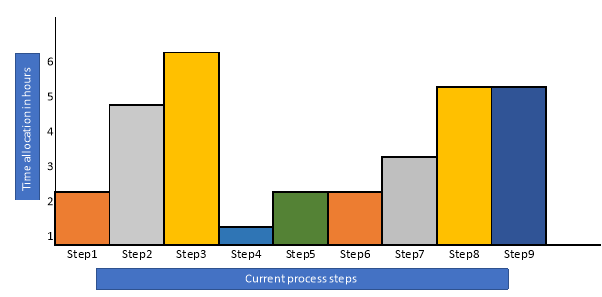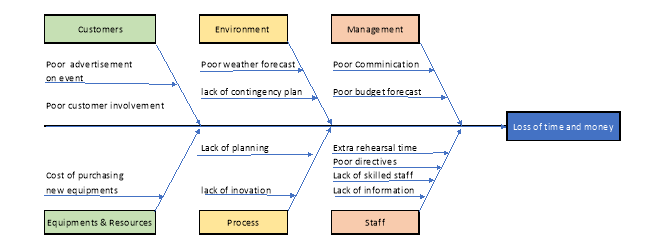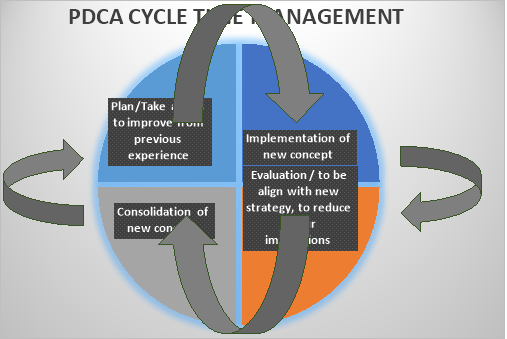Managing Operational Improvement Case Study
Executive Summary
This report is brought forward, explaining a regular operation process of the animation team of the Club Mediterranean of Mauritius island, also identifying some strategies and some improvement path towards its organisational success. The report follows with a thorough analysis of the hotel profile, identifying the strategic process, displayed in the current process flow to show the functional relationship of the issue. Key objectives and purpose of the operation have been identified. Operational strategy is significant for the animation team, which is a top-down process that reflects business strategy through its practical level, and as a bottom-up process that allows understanding and learning at a functional level to contribute to strategic thinking. The discussion ends with some continuous improvement which would take a relentless approach emphasising on continuous incremental change for the better.
1.0 Introduction
   Investopedia defines “Operational management” as the management of business performance to create the highest level of effectiveness possible within an organisation. This, in turn, relates to converting materials and labour into good and services as efficiently as possible to maximise the profit of an organisation. Operational improvement can deliver strategic benefits to the organisation by lowering production cost, improving quality, and ensuring the right quantities of product or services are made available to the customers at the right place and time. (Slack et al, 2015) has identified the objectives of operational performance as quality, speed, dependability, flexibility, and cost. Each business interprets this concept differently in their own personalised way. It is vital that organisation develops and support the operation resources that consolidate its capabilities and strategic advantages in the market, taking into consideration that an operation strategy may require changes and improvements in operational performance. This report is based on the beach party, the operational process of Club Med “la pointe aux cannonier” Mauritius island, its resources, and the improvement strategy around their organisational plan.
2.0 Club Med Company profile
Club Med is one of the leaders in the tourism and leisure industry. Today it owns around 66 villages* and employs 12,811 staff in the most attractive location in the world. Club Med was considered as the creator of all-inclusive prepaid vacation, since the mid-1990`s where they used to own around 100 villages. The Club Med concept was born in the 1950`s when Gerand Blitz, a Belgian sportsman, created a village camp where he invited about 100 of his friends to practise sports on the exotic island of Majorca. From this idea, the new style of vacation was born. (source clubmedplanet.com)
Club Med enjoyed a very strong leadership position during many decades. Its brand image was so powerful that, it did not really need to invest into marketing campaign because the product sold itself by word of mouth among patron and staff. However, Club med did not see the threat coming as other all-inclusive resort arrived on the market and copied its concept. The markets have become more competitive by a large number of new hotels bring created, providing the same all- inclusive benefits and also many other luxury treats. Cloning of what the foundation company has done and it was forced to faced competitive innovation, unfortunately, it was a bit too late to react. Club Med failed to understand the changing demand, and invested on wrong marketing, which did not correspond to the current values anymore. Customers preferences changed, people were less willing to pay a high price vacation for activities they don`t use, Club Med formula was not suitable anymore and its concept was quickly outdated.
Club Med revenues and market shares declined as from the mid-1990`s, and continued to decline with poor economic environment, Club Med was forced to restructure and decided to reinvent a mass market strategy to build volume to recapture the young families market and also upgrading some of its resort from 2-3 trident*, to provide a sense of luxury to be in line with its competition.
3.0 Company analysis Issues
In today`s competitive environment, customers demand is very different to what it was in the past. Nowadays customers demand is focused on, lower cost, better quality at a greater speed. Club Med has always emphasised on its animation and event which contribute to enhance visitor’s experiences. The animation is the process of programming interpretive features or events that make the place to come alive with sensory stimulation and appealed atmosphere. As this department does not generate any income and emphasis is on customer service, increase in operating expenses is unavoidable, such as amenities, equipment, and labour resources that consist about 90% of its function`s total expenses (Sotiriadis, 2005). It has been observed that there is reluctance on behalf of Club Med to moderate animation function due to lack number of guest. Club Med did not upgrade its communication techniques and still, uses a notice board to advertise its daily activities to its customers. There is also a lack of skilled staffs in its animation department which limit ideas and resources for operational improvements. Club Med is losing its customer participation and satisfaction due to its lack of communication, therefore looking at a similar competition with better entertainment and services.
4.0 Current process of the Animation Team
 Evening theme beach party broken down process
Evening theme beach party broken down process

 Management is currently adapting a breakthrough improvement method which has been used for years instead of adapting a continuous strategy method. By understanding the demand of its customers, management should start implementing a new concept process in terms of planning, and ideas. The above process lacks planning, communication, time management and ideas for improvement. Management are not capitalising on this event to generate income and increase participation of its guest. The process implicates qualitative method of forecasting, managements are just relying upon their experience to estimate the cost of the event. A total of 31 worked hours is allocated from planning to completion of the event, and at stage 7, restriction decision has to be made just days before the event which creates time loss due to incorrect planning. To maximise operation performance and to accomplish lean synchronisation, management should eliminate all unnecessary part of the operation by streaming down its processes by harnessing the contribution of all members within the operation and constantly seek improvements.
Management is currently adapting a breakthrough improvement method which has been used for years instead of adapting a continuous strategy method. By understanding the demand of its customers, management should start implementing a new concept process in terms of planning, and ideas. The above process lacks planning, communication, time management and ideas for improvement. Management are not capitalising on this event to generate income and increase participation of its guest. The process implicates qualitative method of forecasting, managements are just relying upon their experience to estimate the cost of the event. A total of 31 worked hours is allocated from planning to completion of the event, and at stage 7, restriction decision has to be made just days before the event which creates time loss due to incorrect planning. To maximise operation performance and to accomplish lean synchronisation, management should eliminate all unnecessary part of the operation by streaming down its processes by harnessing the contribution of all members within the operation and constantly seek improvements.
5.0 Key improvement strategies for the animation team
Club Med operation managers should be able to step outside their comfort zone and see operational objectives in the light of the organisation `s guiding its business strategy. To understand these issues, they should focus on volume/ variety issues, process objectives, process layout, process technology, and business process reengineering. The volume/variety decision is a response to the need of the market, which is directly proportional to the main objectives of process management. also, a good layout will help maximise operational effectiveness and efficiency.
5.1 Quality of service for customers
The customer expectations are the basis of satisfaction. After experiencing the service, they compare their expectations with experience. The result can change from satisfaction to dissatisfaction. The customer anticipates the service standards according to their expectations before reaching a decision, creating their own individual benchmark. The use of Club Med continuous improvement process, for long-term goals, low cost and waiting for better result trying to make it work, while ignoring the changing market demand, returning customers always complain of having the same animation events, that they experienced in the past. Customers are now considering other options for their next holidays by looking at options that segment families with kids, youth, adults with the arrival and duration of stay, careful consideration to the balance distribution and frequency of activities. Emphasis on encouraging children’s participation in animation event will also attract parents who wish to spend some time on their own while on vacation with the whole family (Mikulic & Prebezac, 2011).
5.2 Planning Efficiency
With adequate planning and focus on coordinating towards competitive strategies, this will create a benchmark for the control process. At a strategic level, cost control supports decision-making, as it aims to align the organisation cost structure with the actual expenditure, as well as to evaluate the efficiency of the organisation (Anderson, 2006). Some essential policy decisions need to be reviewed, even though Club Med adapts an all-inclusive notion where most entertainment activities are offered as part of their packages. A new strategy could be implemented where the guest is seeking extra services where extra charge can be applied. Appropriate training of staffs to attract customer`s participation and encourage upselling can also generate sales. Club Med should focus on process technology, considering the cost/benefit trade-off exercise.
5.3 Communication and advertisement of activities.
The entertainment services promotion is an essential requirement for an event success. At this end, some techniques and methods that are currently used are animation desk at the lobby area, welcome and info session with the animation team, information board describing all the activities and time and personal contact. Receiving feedback from customers, non-animation staffs are unaware of the current promotion or events occurring in the resort due to a lack of communication between departments. Staff meeting should be encouraged formally or informally. Even though the resort is providing enough entertainment, it seems to lack in communicating between staff and customers. Further to this issue, the organisation should investigate at cost effective advertising platform, and how to increase customer` s participation.
6.0 Conclusion
From the above processes of Club Med Mauritius discussed, it is advisable that the resort instead of being just a business model that is focusing on the standard way of doing business, should emphasise more on the “Operating Model”, which set the processes of the organisation that best serves the business model in satisfying customers and generating revenue. There should be continuous improvement regarding quality management and operation improvements. As mentioned, management should also focus on the business process reengineering, looking to redevise the process as a total value-adding system focused on customer’s needs and delivering competitive advantage on the market. This can be achieved by adopting the Six Sigma approach which is based on the degree of variation of a process from the mean. Application of this concept will bring tight control which induces the organisation to change its processes and task as part of their quality strategy, which in return will provide products, services, or processes with extremely high capabilities and as a program to lower cost, save time and improve customer activities held by the resort. Management should use accurate forecasting techniques for their projects, and prioritise on tasks that are more important. My suggestion is to use network diagram to show how all the task are interrelated to have a clear view of the performance of the project, by estimating the time and resources for the activities, identifying how the activities are related to the network analysis, then identify time constraints for work and resources, and lastly consolidate the network and set up schedule for time and resources. Controlling project performance is also very important, by comparing actual and planned outcomes at every stage, taking into consideration any unforeseen events. Summing up, it is important for each and every business to understand the tactical and strategic role and objectives of operational management, and to understand the impact of operation strategy on successful achievement of organisational goals and objectives.
7.0 Recommendation
7.1 Generating Extra Sales during events
Club Med could generate extra income by creating a dress code theme for its evening entertainment, e.g. red shirt, and white shorts, where guests, who wants to participate will feel part of the entertainments. This will increase sales for the Club Med boutique
Looking at the demographic of guest staying at the resort, management could implement a special beverage table by the hotel bar during events, at extra charge. Special focus on demand from customer e.g. a healthy drinks options for young kids and families or special cocktail and premium alcoholic beverage for the adults.
Club Med, does not provide in-room service for food and drinks. During events, the Food and beverage department could implement a new idea of preparing a pick-nick basket for an extra charge.
Hiring quality animation staff for the animation department could generate extra income by providing dancing lessons, Hayne tattoo and portrait painting by the painter decorator.
7.2 Upgrading communication techniques
Taking into consideration the theory of constraints, which emphasis on the bottleneck system which set the drum beat of the process flow, thereby considering the “Rope” which represent the need for communication to control the flow prior to the bottleneck. The out-dated communication techniques currently used, are not gathering enough numbers during events. Investing in technology for e.g. flat screen TV display and mobile apps will increase participation, where patron will be notified of the daily activities on schedule.
7.3 New Reengineer Concept process
Taking into consideration the high volume and low variety problem, management should adopt the Gantt chart, which will help for scheduling to large operation. One deficiency of this chart is it sometimes must be redrawn when there is a change to the schedule. There should be a line balance in the production line for a smooth process. Accurate forecast and planning to evaluate the cost and variations of the new concept which will be a one-off investment. By contrast, when demand is variable or unpredictable, resources must be adjusted over time, (Operational & Process Management 4th edition, p22) this will depend on the composition of the guest at the resort. Using the new process on a regular basis will generate sales towards the boutique and the F&B department, the new stream down process will become more cost effective in terms of labour implication which has been reduced from 31h to 14h from start to completion of the event. Alternatively, if the change has not been successful, management could learn from the “trial” are formalised before the PDCA cycle starts again.

![Operation assignment.AahsishM [Compatibility Mode] - Word](https://aaimagestore.s3.amazonaws.com/july2017/0016371.008.png)
8.0 References
AIM learning materials & Online lecture notes
Anderson, C.K., & Xie, X. (2010). Improving hospitality industry sales twenty-five years of revenue management. Cornell hospitality, 51(1), 53-67.
Bowdin, G., Allen, J., O`Toole, W., Harris, R. & McDonnell, I. (2011). Events management. 3rd Ed. Oxford: Elsevier Butterworth Heinemann.
Club Med la Pointe Aux Cannonier, Ile Maurice Journal published August 2016
Club Med (2015). Corporate official website: Http://www.Clubmed.com , viewed on March 02, 2017
Mikulic, J., & Prebezac, D. (2011). Evaluating hotel animation program at Mediterranean sun and sea resort: An impact-asymmetry analysis. Tourism Management
Operational & Process Management 4th edition/Principles and practice for strategic Impact/Nigel Slack, Alistair Brandon-jones, Robert Johnston, Alan Betts
Sotiriadis, M. (2005). Financial management of hotel operations. Athens: Propobos
Slack, N 2015, Operations Strategy, 4th Edition, Pearson (Intl). Available from: Bookshelf Online.
www.Investopedia.com/terms/o/operations-management.asp , viewed on March 01, 2017
9.0 Appendix
Tridents*-Club Med terms for Rating its resort.
Villages*-Club Med terms to call its resorts.